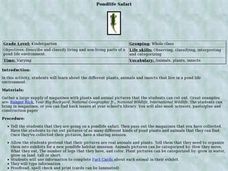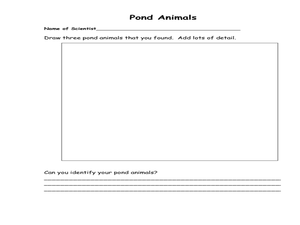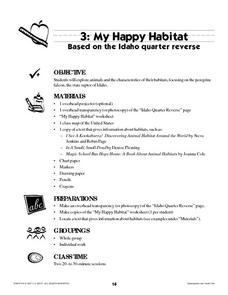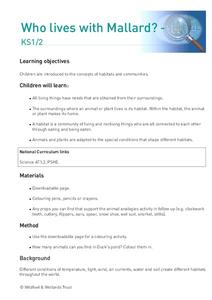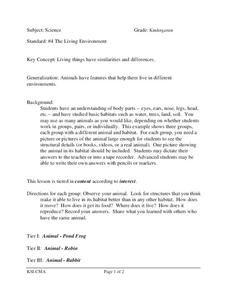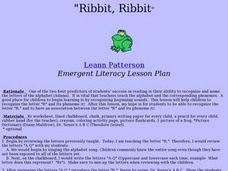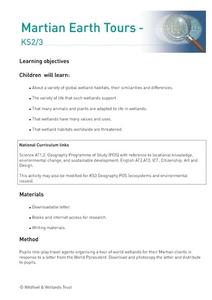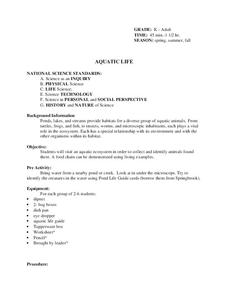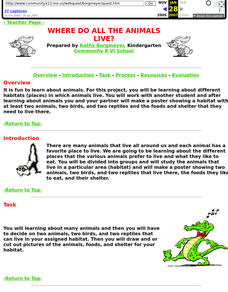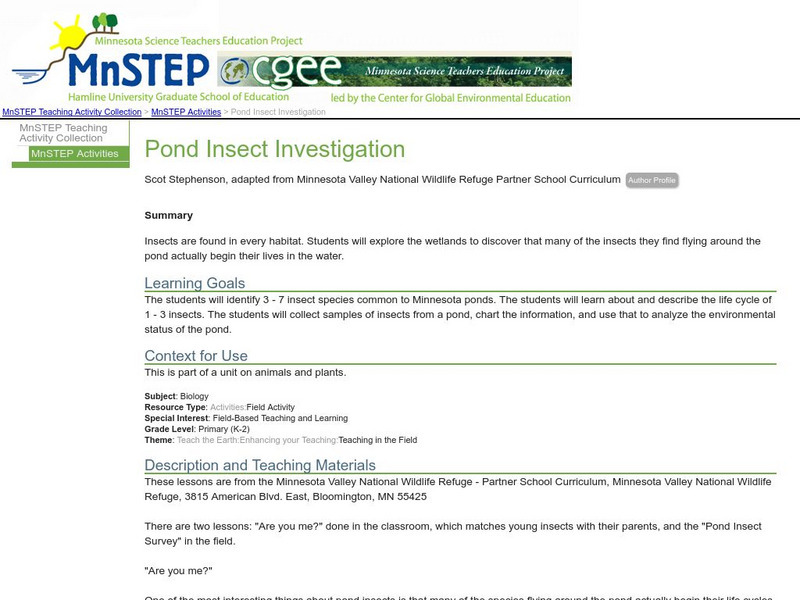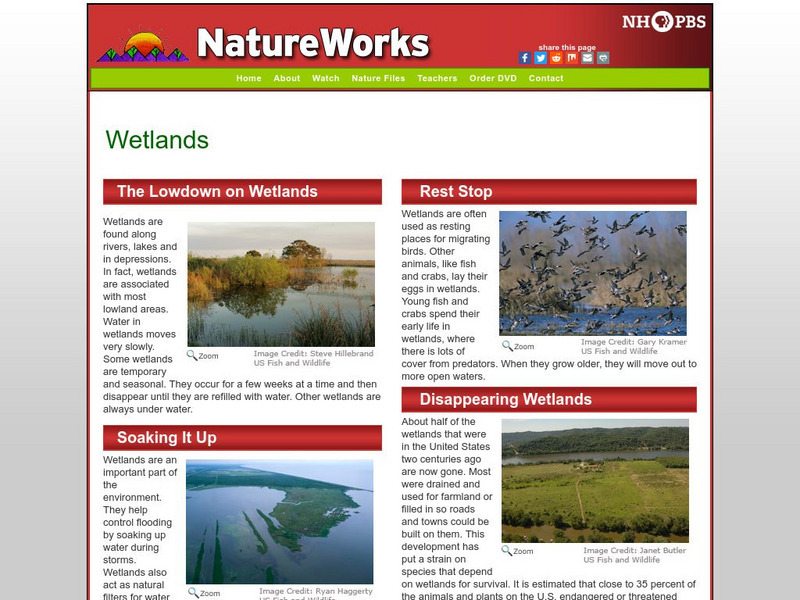Alabama Wildlife Federation
Life in a Pond
What living things call an aquatic habitat home? Young learners consider the question after they discuss the characteristics of a typical pond habitat. They identify an animal and then determine if a pond would have all the components to...
Curated OER
Small Pond Creatures
Students complete a unit about the different creatures that can live in a small pond habitat. They create a glossary, create a class Small Pond mural, develop a Frog Fact File, read a variety of books, and conduct research for a report...
Curated OER
Pond-life Safari
Students determine the living and non-living parts of pond life. In this pond life lesson, students examine the plants, animals, and insects that live in ponds. They look through a variety of print media, cut out pictures, and arrange...
Curated OER
Animal Habitat Dioramas
What a better way to have learners show what they know than with a diorama? Kids research an animal, its habitat, ecosystem, and environment in order to create a three-dimensional diorama. Have older children write a short paper on their...
Curated OER
Habitat Sunprints
Young scholars recognize various habitats and where they are found. In this habitat sunprints lesson, students observe the contents of habitats and record what the sunprint might represent. Young scholars use blueprint paper and small...
Curated OER
Pond and Pond Organisms
Students explore pond ecosystems. In this pond organism activity, students will use pond water and a plastic bad in order to locate and identify freshwater organisms. The activity is designed for younger grades, but includes an...
Curated OER
My Happy Habitat
Students observe and discuss the Idaho state quarter to begin an activity in which they define and draw different types of habitats. They discuss the habitats that the migrating Peregrine falcon, which appears on the Idaho quarter,...
Curated OER
Pond Animals During The Seasons
Students interact with a CD Rom to examine pond life. In this pond life activity, students access a CD Rom entitled "Sammy's Science House CD Rom" in order to see pond life during the different season of the year. They study the...
Curated OER
Who lives with Mallard?
Students explore how all living things have needs that are obtained from their surroundings. They identify the surroundings where an animal or plant lives is its habitat. Students identify that a habitat is a community of living and...
Curated OER
Froggy Fun
Students exploring about frogs and their environment. They describe what camouflage is and why it is useful to frogs especially in the environment that frogs live in. They also draw a picture of a frog in its habitat.
Curated OER
The Living Environment
Students investigate animals and their environments. In this animal similarities and differences lesson plan, students explore animal adaptations and features and their habitats. Students get into groups to discuss the habitat and how...
Curated OER
Ribbit! Ribbit!
Learners research a frog's life cycle and habitat using books, the Internet and lecture. Students make origami frogs, write letters to Toad from Arnold Lobel's "Frog and Toad" and participate in a simulated camouflage activity.
Curated OER
Sprinkles 5
In this environment learning exercise, students read the information and complete the survey about their own local habitats and some of the others in Florida.
Curated OER
Martian Earth Tours
Students study a variety of global wetland habitats, their similarities and differences. They examine the variety of life that such wetlands support and determine that many animals and plants are adapted to life in wetlands, that...
Curated OER
Adding More
In this addition worksheet, students solve six problems in which objects in a set are counted and additional objects are added to these, according to directions. Students write how many in all.
Curated OER
Aquatic Life
Students explore aquatic life. In this science instructional activity, students visit an aquatic ecosystem and collect animals found there. Students create a food chain for the aquatic ecosystem.
Curated OER
Animal Tracks
Students study animals. In this science lesson plan, students make plaster casts of animals that live in the area. Students identify the tracks.
Curated OER
Where Do All the Animals Live?
Students study animal habitats and make a poster showing two animals, two birds, and two reptiles in their habitats.
Curated OER
"Habitats"
Students complete a unit of lessons on animals and animal conservation. They observe a square meter of ground outside the school, set up a model environment, analyze an owl pellet, grow bread mold, and explore various websites.
Science Education Resource Center at Carleton College
Serc: Pond Insect Investigation
Insects are found in every habitat. Young scholars will learn about the life cycle of insects by exploring Minnesota ponds and the insects that live in them.
Science Education Resource Center at Carleton College
Serc: Mn Step: What Is in the Pond?
This is a scientific investigation where students establish what macro-invertebrates live in a local water habitat (stream, pond, aquarium), and predict how healthy the water is. They then test the water quality, record the data, and...
Science Education Resource Center at Carleton College
Serc: Fish Habitats
During this instructional activity, young scholars spend time looking at pictures of fish and their habitat, talking about what all animals need to live, making a poster of a fish habitat, and finally visiting a lake.
PBS
Nh Pbs: Nature Works: Swamps
What characteristics make a swamp a swamp? This site features information on the Great Dismal Swamp, Conifer Swamps, Okefenokee Swamps, Shrub Swamps, Hardwood Swamps, and Cypress Swamps. This site also offers some great photographs of...
PBS
Nh Pbs: Nature Works: Wetlands
Did you know that wetlands are frequently used as resting stops for migrating birds? This is just one of the many interesting facts found within this educational resource. This site features information on the characteristics, types,...
Other popular searches
- Pond Habitat Diorama
- Pond Habitat Kindergarten
- Pond Habitat Color Sheet
- Pond Habitat for Frogs
- Pond Habitat Food Chain
- Pond Habitat Assessments
- Pond Habitat Diarama
- Pond Habitats
- California Pond Habitats
- Pr Test on Pond Habitats




